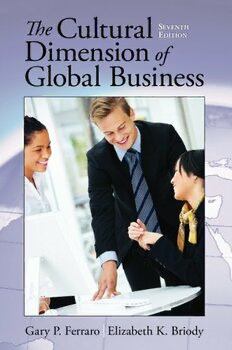
The Cultural Dimension of Global Business PDF
Preview The Cultural Dimension of Global Business
SEVENTH EDITION THE CULTURAL DIMENSION OF GLOBAL BUSINESS Gary P. Ferraro The University of North Carolina at Charlotte Elizabeth K. Briody Cultural Keys LLC First published 2013, 2010, 2006, 2002 by Pearson Education, Inc. Published 2016 by Routledge 2 Park Square, Milton Park, Abingdon, Oxon OX14 4RN 711 Third Avenue, New York, NY, 10017, USA Routledge is an imprint of the Taylor & Francis Group, an informa business Copyright © 2013, 2010, 2006, 2002 Taylor & Francis. All rights reserved All rights reserved. No part of this book may be reprinted or reproduced or utilised in any form or by any electronic, mechanical, or other means, now known or hereafter invented, including photocopying and recording, or in any information storage or retrieval system, without permission in writing from the publishers. Notices: Product or corporate names may be trademarks or registered trademarks, and are used only for identification and explanation without intent to infringe. Credits and acknowledgments borrowed from other sources and reproduced, with permission, in this textbook appear on appropriate page within text on page 281. ISBN: 9780205835591 (pbk) Cover Designer: Suzanne Duda Library of Congress Cataloging-in-Publication Data Ferraro, Gary P. The cultural dimension of global business / Gary P. Ferraro, Elizabeth K. Briody.—7th ed. p. cm. Includes bibliographical references and index. ISBN-13: 978-0-205-83559-1 (alk. paper) ISBN-10: 0-205-83559-7 (alk. paper) 1. International business enterprises—Social aspects. 2. Intercultural communication. 3. Technical assistance—Anthropological aspects. I. Briody, Elizabeth Kathleen. II. Title. HD2755.5.F48 2013 302.3′5—dc23 2012013804 Please visit the companion website at www.routledge.com/9780205835591 Contents Preface 1. Cultural Anthropology and Global Business Introduction: Global Connections The Perspective of Cultural Anthropology Cultural Anthropology and Business Anthropology’s Major Concept: Culture Culture Is Learned Culture Influences Biological Processes Cultural Universals Do Exist Cultural Change People from All Cultures Are Ethnocentric Cultures Are Integrated Wholes Corporations Also Have Cultures Cultural Differences in Business: Challenges and Opportunities Cross-Cultural Scenarios 2. Lenses for Understanding Culture and Cultural Differences Contrasting Values The Individual–Collective Dimension The Equality–Hierarchy Dimension The Change Orientation Dimension The Time Orientation Dimension Context Metaphors Change Conclusion Cross-Cultural Scenarios 3. Communicating across Cultures: The Nonverbal Dimension The Nature of Nonverbal Communication Types of Nonverbal Communication Potential pitfalls in Studying Nonverbal Communication Business Introductions Business Card Exchange Bowing Gift Giving Interactions Among Businesspeople Body Posture Gaze Hand Gestures Facial Expressions Dress Proxemics New Technologies and Visual Media Conclusion Cross-Cultural Scenarios 4. Communicating across Cultures: Language The Ideal of Linguistic Proficiency in Global Business Linguistic Diversity Language and Culture The Influence of Culture on Language The Influence of Language on Culture Language Mirrors Values Linguistic Style Language and Social Context Some Additional Complicating Factors Slang Euphemisms Verbal Dueling Humor Conversational Taboos Information And Communication Technologies in the 21St Century Conclusion Cross-Cultural Scenarios 5. Negotiating across Cultures The Nature of Cross-Cultural Negotiation Where to Negotiate Effective Strategies for International Negotiators Avoid Cultural Cluelessness Concentrate on Long-Term Relationships, Not Short-Term Contracts Focus on the Interests behind the Positions Avoid Overreliance on Cultural Generalizations Be Sensitive to Timing Remain Flexible Prepare Carefully Learn to Listen, Not Just Speak Act Ethically and with Integrity The Use of Interpreters The Global Negotiator Cross-Cultural Scenarios 6. Partnering across Cultures Partnership Basics Meetings as Opportunities for Collaboration Meetings and National-Culture Differences Meetings and Organizational-Culture Differences Lessons Drawn from Meetings Decision-Making Models to Advance the Partnership Work Decision Making and Cultural Differences Decision Making and Organizational-Culture Differences The Impact of Decision-Making Differences Lessons Drawn from Decision-Making Models Partnering Relationships and Problem Solving Partnering with On-Site Work Colleagues Distinctions between Local and Global Partnerships Global Virtual Partnerships Partnership Life Cycle Partnership Process Outcomes Partnership Product Outcomes Lessons Drawn from Partnering Relationships and Problem Solving Cross-Cultural Scenarios 7. Coping with Culture Shock The Nature of Culture Shock Definition Impact While Abroad Impact upon Repatriation Minimizing Culture Shock Weigh the Alternatives Prepare Carefully Additional Suggestions Cross-Cultural Scenarios 8. Developing Global Leaders Globally Oriented Firms Creating a Globally Oriented Workforce The Evolving Profile of the Overseas Assignment Fluctuation in Expatriate Numbers The Rise in Short-Term Assignments Expatriate Strategy Pros and Cons Selection Technical Skills Ability to Adjust Useful Selection Criteria Selection Models Preparation Language Training Cross-Cultural Training The Specifics of Overseas Life and the Job In-Country Support A Role for the Corporation Accessing Local Networks Repatriation Repatriation Track Record Global Strategy Reimagined Global Leaders for the 21st Century Cross-Cultural Scenarios Appendix A Cross-Cultural Scenario Discussions Appendix B Locating Relevant Cultural Information The Traditional Anthropological Approach Documentary Sources Useful in Developing a Cultural Profile Culture-Specific Associations Some Country-Specific Sources U.S. Government Sources Sources of Country-Specific News and Current Events The Electronic Library Human Resources for Culture-Specific Information One’s Own Company Academia Foreign Trade Offices Private-Sector Consultants and Trainers The Search for Cultural Information Upon Arrival In-Country Documentary Resources In-Country Human Resources Conclusion References Photo Credits Index
